The Missing People
THE MISSING
PERSONS
Introduction
In the summer of 1974, Turkish troops invaded and occupied
more than a third of the teritory of the Republic of Cyprus.
Over the years those who lost their loved ones, their homes
and their livelihoods have begun the painful process of rebund-
ing their shattered lives. But for us, the fathers, the mothers,
the brothers, the sisters and the children of the "missing" the
passage of time has deepened, rather than healed the wounds
inflicted by the Turkish invasion.
There are 1.619 missing persons, our relatives. This
number includes not only soldiers, but also civilians and among
them women and children, who disappeared consequent to
the Turkish invasion of Cyprus in 1974. These missing Greek
Cypriots were arrested by the Turkish army and/or by Turkish
Cypriots under the control and command of Turkey's armed
forces. Subsequent to their arrest, many were transported to
Turkey and kept as prisoners in Turkish jails. Since 1974,
despite our appeals to the Turkish Government and to other
International Organizations, and contrary to International Law
and Human Rights Conventions, Turkey refuses to provide us
with any information about the fate of our loved ones. Instead,
the Turkish Government is insisting that it knows nothing about
the fate of our relatives, and furthermore, that no Greek Cypriot
missing, persons are held.
Turkey's claims, however, are not supported by any facts.
During discussions in the presence of UN and ICRC Representatives, on the few occasions when the Turkish side was
compelled to accept unannounced visits to places where according to information Greek Cypriots were to be found, several
Greek Cypriot missing persons were found imprisoned in the
Turkish occupied areas. For example, on 20 November 1974
the following persons were found after one such visit:
(a) George Kaiser of Kyrenia,
(b) Michael Frangopoulos of Bellapais,
(c) Michael Ponticou of Morphou,
(d) Cleanthis Charalambous of Lakatamia,
(e) Andreas Katsouris of Styllos, Famagusta.
Similarly on 7 August 1975, Charalambos Moschovias of
Achna and Stelios Gregorakis of Ayia Trias were found in the
same way. Finally, on 25 October 1976, Lambros Plitsis from
Larissa, Greece, was also found.
There is hard and indisputable evidence establishing,
beyond any doubt, that the disappeared persons were alive
and well at the time of their arrest by the Turkish army. This
evidence is founded on:
- eye witness accounts and sworn testimonies stating that a
large number of the missing, were arrested by Turkish
military personnel after the cessation of hostilities (Appendix I)
- sighting in captivity in mainland Turkish prisons and other
detention centers in the occupied part of Cyprus (Appendix II)
- photographic evidence from the Turkish and international
press showing clearly identifiable missing persons in the
custody of Turkish troops both in Cyprus and in mainland
Turkish jails (Appendix III)
- Messages from missing persons broadcast, after their ar-
rest, by Turkish radio (Appendix IV)
- Red cross lists including the names of missing persons
compiled during visits in Turkish detention centers (Appendix V).
In 1975, the Human Rights Organization, Amnesty
International, presented the Turkish Government with a list of 40
missing persons about whom it has compiled evidence
pointing to their presence in mainland Turkish prisons. No response
to Amnesty's demands for an account was ever received from
the Turkish Government. Turkey is constantly rejecting the
efforts of humanitarian bodies, and blocks attempts by the
international community to investigate the fate of our disappeared
relatives. Although a Committee on Missing Persons
was set up under the auspices of the United Nations in 1981,
the Turkish Government is not represented and does not par-
ticipate in its proceedings. It is not, therefore, surprising that
the Committee, after so may years of investigations, has failed
to determine the fate of a single disappeared person and to
inform the family concerned accordingly.
This have been noted by the Secretary General of the United
Nations, who in an effort to make the Committee effective,
suggested to both sides to submit all cases in order to group
them and continue investigations in a more systematic manner.
He also called for urgent consultations to reach consensus on
the criteria for the decisions to be taken after the investigations.
These suggestions were included in his November 1993 report
to the Security Council, S/26777.
Our Committee appreciates and views positively the initiative
of the Secretary General and hopes that progress will be
achieved soon, and the needed convincing information will be
presented, to allow the full determination of the fate of all
missing persons. To this end the cooperation of all concerned
is needed, particularly from the Turkish side, which must, at
last, decide to reveal the information in its possession on what
happened to our loved ones after their disappearance.
The Turkish Government, in its refusal to recognize its
obligation to account for the fate of Greek Cypriots held in its
custody, is guilty of one of the most heinous crimes against
humanity - the crime of enforced disappearance; a crime which
is not subject to time limitation,,. As the Verde Report, which
was submitted on September 1984 to the Parliamentary
Assembly of the Council of Europe, states:
Enforced disappearance is one of the most serious violations of the
human rights safeguarded by international instruments: it infringes
virtually on all the victims' personal
rights and many of the rights of their families. The violations...
cannot be justified by special circumstances, whether
armed conflict, state of emergency or internal unrest or
tension.
This ongoing crime is a stain on Turkey's international
reputation. More importantly, it is a crime which perpetuates
the sufferings of the missing,, and their families, a crime which
constitutes the most flagrant violation of the basic and
fundamental human rights of both the missing persons and us,
their families.
Our one and only demand is a profoundly human one. It is
a simple demand for the full restoration and respect of the basic
and fundamental human rights of the missing persons and
ourselves.
IS IT TOO MUCH TO ASK?
Missing Persons
Categories and age groups of missing persons
| Missing persons |
Men |
Women |
Total |
| Reservists/Soldiers |
992 |
- |
992 |
| Civilians |
511 |
116 |
627 |
| Total |
1503 |
116 |
1619 |
| Age |
Over 60 |
40-60 |
16-39 |
Under 16 |
Total |
| Men |
257 |
226 |
995 |
25 |
1503 |
| Women |
58 |
15 |
41 |
2 |
116 |
| Total |
315 |
241 |
1036 |
27 |
1619 |
A P P E N D I C E S
EVIDENCE ABOUT MISSING PERSONS
A P P E N D I X I
EYE WITNESS ACCOUNTS AND SWORN TESTIMONIES
DOCUMENTING THE ARREST OF PERSONS, STILL MISSING,
BY TURKISH FORCES AFTER THE CESSATION OF HOSTILITIES .
Summary of testimony given by Froso Demetriou
from Voni village
She states that on 14.8.1974, the day the second
phase of the Turkish invasion began, while she was at
home with her husband and children, 37 soldiers of the
Cypriot National Guard took refuge in her house. She
provided them with civilian clothes and they burnt their
army uniforms and hid their weapons. That night they
stayed over at her house and at two other adjacent
houses which belonged to her relatives. During the night,
35 out of 37 soldiers entered their names in a catalogue
and the remaining two mentiond their names to her. This
list was prepared for her to hand over to the International
Red Cross. Also white cloth was hanged over the doors
of the houses they were staying to indicate their intention
of giving themselves up.
In the morning of 15.8.1974 two of the soldiers left the
house to see if there was an escape route and they would
return. After a while though, that is at about 08:00 - 09:00,
and while the two soldiers were still out, armed men
appeared outside her house and started shooting. She
recognized them as the Turkish Cypriots Assasis Fahri
from Beykoy, and the shepherds Halil ans Sallahis, the
son of the Muktar, both of them from Epiho. The 35
soldiers gave themselves up. All those who were arrested
were led on foot in the direction of the Turkish village of
Epiho. Ever since then their fate has been unknown.
Summary of testimony given by Lambis Elia
from Hartsia village
On 13.9.1974 the Turks arrested my two sons,
Michael, aged 17, and Elia aged 19, and took them to
their camp near our village. On the same day I met the
Turkish Cypriot, Nazim Ahmet, aged 60, who is a friend
of mine and I asked him to take me to the Turkish Army
Officer. He did take me and the following day, on
14.9.1974, the Turkish Officer allowed me to see my sons
for ten minutes. The next day, 15.9.1974, the Officer
allowed me to see them again and this time I was with
my wife. We saw them for some time in the Turkish camp
where they were being held.
On 16.9.1974 at around 14:00, a party of the International
Red Cross came to our village. I told them about
the arrest of my sons and I led them to the area of the
Turkish camp. Unfortunately, however, the Turkish Army
Officer denied that he was holding any prisoners and did
not allow the Red Cross to carry out an investigation.
Since then, nothing has become known about the fate
of my two sons.
Summary of testimony given by Costas Andreou
from Assia, father of the missing Andreas Kassapis
He states that on 20.8.1974, at around 13:30 while he
was in his home at Assia with his son and his son-in-law,
Leondios Leondiou, now both missing, his wife and two
daughters, the Turkish Cypriot Gemali Batti and his son
Asli from Aphania entered his home and arrested at gun-
point his son and his son-in-law. They forced them to
board a tractor and transferred them to an unknown
destination. He further mentions that his son is a US
citizen and student.
His name is included in the list of students (No. 61)
which the Turkish side gave to the Government on
8.11.1974 for the purpose of releasing him.
A P P E N D I X II
SIGHTING OF MISSING PERSONS IN MAINLAND TURKISH
PRISONS
Summary of testimony given by Christakis
loannou from Pano Dhikomo
On 15.8.1974 he was taken prisoner by the Turks at
Palekythro. He was transferred together with other
prisoners to Paviides garage and on 31.8.1974 to Adana
prisons, Turkey. He was in cell No. 9. In the same cell
was also Andreas Varnava from Potamia, whom he met
there and whose name he heard being called out by the
Turks. Andreas Varnava who is now missing, stayed in
the witnesses cell for 3-4 days and he was thereafter
transferred to another place. He has not been seen since
then.
Summary of testimony given by Andreas
Nicodemos from Trimithi, Kyrenia District
He was a reservist. On 29.9.1974 while he was in his
village Trimithi he was taken prisoner by Turkish soldiers
together with other co-villagers. On 30.7.1974 he was
transferred to Turkey to Adana prisons together with many
other prisoners. On 20 or 21.8.1974 while the Turks were
taking them out in the yard he heard someone call out
his name. The person who called him, as he immediately
found out, was his co-villager Kyriakos Frixou, who is now
missing. He shook hands with him and they spoke about
where and how they were arrested. At that moment they
were ordered by the Turks to enter their cells. Since then
no one has seen the missing.
Summary of testimony given by Costas
Themistocleous from Omorphita
He mentions that he was taken prisoner at Palekythro
by Turkish troops during the 2nd round of the Turkish
invasion. After staying at different detention centers he,
together with other prisoners, ended up at Adana prisons
in Turkey. On 17.10.1974 while the prisoners were preparing
to be transported to Cyprus for their release, he saw
Savvas Apostolides, now missing, from Neo Horio
Kythrea, who was a good friend of his. He did not speak
to him, for it was forbidden. Instead he greeted him
raising his hands and the missing reciprocated.
A P P E N D I X III
IDENTIFICATION OF MISSING PERSONS FROM PHOTOGRAPHIC
EVIDENCE IN THE TURKISH AND INTERNATIONAL PRESS.
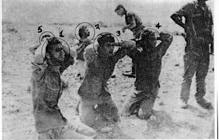
This photo was taken by a Turkish war reporter.
Identified prisoners still missing:
1. Korellis Antonakis tou Michael, age 30, from
Kythrea
2. Nicolaou Paniccos tou Chrysostomou, age 26,
from Achna
3. Skordis Christoforos tou Georghiou, age 25, from
Dhali
4. Papayiannis loannis tou Charalambous, age 24,
from Aglangia
5. Hadjikyriakos Philippos tou Stephani, age 19,
from Famagusta

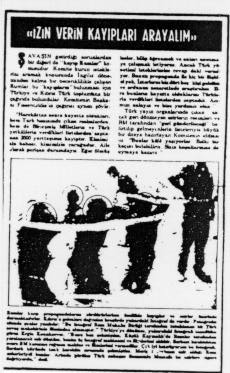
Translation of the Article
in MILLIYET
In this issue of the Istanbul daily, MILLIYET of 23 June, 1976
Mr Mehmet Ali Birand, the Turkish journalist who visited Cyprus, writes under
the heading ALLOW US TO SEARCH
FOR THE MISSING PERSONS:
One of the problems created after the
war is the missing Greek Cypriots
question. In order to find these missing
persons the Greeks have formed a
Committee. Formed after the pattern of
similar committees during the British
administration of Cyprus, the Committee is working very efficiently.
The President of the Committee, Mr Fysentzides, has appealed to Turkey and
to the Turkish community in Cyprus to help them locate these missing
persons.
Mr Fysentzides has said in his appeal: Relying on the pictures
published in the Turkish press and on documents and lists submitted by
the UN and Turkish authorities, we have established that 2,000
of our compatriots are missing after the Turkish military
operation. They are our fathers and sons. As families we are in
distress. We want to know whether or not they are dead. If they
are, we will try to remedy our grief. However, the Turkish
leadership is refusing to answer our call. This has nothing to do
with propaganda. If the Turkish authorities agree, we will send four or five people and under the Turkish army's supervision, we will search for them, because we have established from the list submitted to
us that they are alive.
Try to understand our suffering and help us.
The Pancyprian Committee of Parents and Relatives of Undeclared
Prisoners of War and Missing Persons bases its arguments on pictures
published in the Turkish press
and on UN name lists of prisoners to be returned. The
Committee believes that the
missing persons are still alive and perhaps it could locate and find some
of them.
We are ready to obey all your orders says the Committee's
President.
Under this interview a picture is published in which four Greek National
Guardsmen
are shown surrendering to the Turkish forces. Mr Birand writes:
The Greeks are continuing their progapanda, especially on missing persons and
POWs. People visiting Cyprus are handed brochures, in which the above
picture is included. The following is printed under the picture: The
picture was taken by a
Turkish war correspondent captured by Greek National Guardsmen>.
When I returned to Turkey, Mr Ergun Konuksever saw the picture by chance and
quickly recognized it and said: It was I who took this picture when I was
wounded in Kuchuk Kaimakli (Omorphita) and taken prisoner by Greeks.
They seized my three
cameras and films.ln spite of the UN's decision, they did not return them
to me when I was freed. I remember very well taking this picture in
Serdarli (Chattos village)
during the tank operation. These are the Greek POW's captured by the tank crew
MERIC I and the soldier in the foreground is Corporal Mustafa from SAMSUN
offering cigarettes to the POW's.

SPECIAL - N E W S - B U L L E T I N
Special NEWS BULLETIN (a Turkish Cypriot Publication),
Wed- nesday 4 September 1974
Greek Cypriot POW's during lunch hour. They were visited
yesterday by the Representatives of the Turkish Red Crescent
who toured all Prisoner of War Camps in the Turkish
controlled region of the island to ascertain the needs of the
prisoners.
The following persons, identified in the photo, are still
missing:
1. Thomas Eleftherios tou Christou, age 20, from Lapithos
2. Kyriakos (Tzirkakas) Demetrios tou Panteli, age 20, from
Ay. Varvara
3. Philippides Andreas tou Georghiou, age 30, from Nicosia
4. Stavrinou loannis tou Stavrou, age 20, from Kapouti
STILLS FROM A BBC DOCUMENTARY FILM TAKEN AT ADANA PRISONS -
TURKEY, BROADCAST IN LONDON ON 4.9.1974
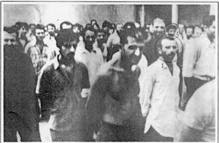
A 1. GEORGIOU Andreas George - Latsia (age 26 at time
of arrest)
2. STEPHANIDES Charalambos Demetris - Nicosia (age 19)
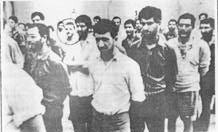
B 1. PETRIDES Nicos Petros - Episkopio (age
32)
2. SYZINOS Demetrios Phillipos - Yipsou (age 50)
A P P E N D I X IV
NAMES OF PERSONS ARRESTED BY THE TURKISH INVADiNG
FORCES WHO CONVEYED MESSAGES TO THEIR FAMILIES
OVER THE ILLEGAL TURKISH CYPRIOT RADIO BAYRAK
WHILE IN CAPTIVITY AND WHOSE PRESENT WHEREABOUTS
ARE STILL UNKNOWN.
NAMES
ANDREOU SOTIRIS
CHRYSILIOU ANASTASIOS
CONSTANTINOU COSTAS
DRAKOS GEORGHIOS
GEORGALLAS GEORGHIOS
HADJIKYRIAKOU GEORGHIOS
KALAPODAS CHRISTAKIS
KORELLIS ANTONAKIS
KOUSPOU SOTERIS
MICHAELf GEORGHIOS
MOUSCOU CHRISTAKIS
PAPACHRISTOFOROU ALEXANDROS
PETRI CHRISTOS
PYRKOS DEMETRIOS
YAGOUMETTIS IACOVOS
ZAMBAS MICHALAKIS
TESTIMONIES DOCUMENTING MESSAGES BROADCASTED
ON BAYRAK FROM PERSONS STILL MISSING
Summary of testimony given by Kiki Andreou
Symeonides from Kythrea
During the course of the second phase of the Turkish
invasion, that is on 14.8.74, Kiki Andreou together with
her family went to Kalopanayiotis. On 15 or 16 August
1974 and at about 20:00 while she was listening to the
Greek broadcast of the illegal Turkish Cypriot radiostation BAYRAK,
the announcer said that at that moment
messages by captured national guards-men would be
broadcast. Among those who spoke she heard her co-villager
Antonakis Korellis, whom she knew very well say:
I am Antonakis Korellis from Kythrea, we are doing fine.
Both her family and herself were certain that the person who
spoke was indeed her co-villager, Antonakis Korellis.
Summary of testimony given by Yiannoula
Paviou Argyrou from Kato Lakatamia
On 8 or 9 August 1974 and at about 20:00, after the
news bulletin of the illegal Turkish Cypriot radio station
BAYRAK, Yiannoulla heard messages by Greek Cypriot
prisoners. Among those who delivered a message was
someone named Demetrios Pyrkas from Mammari. He
stated his name, that he was from Mammari and that he
was fine. She herself did not know this missing person.
Summary of testimony given by Costas Georgi
from Assia village
During the course of the Turkish invasion he was
working for MACHI and THARROS newspapers and among
his duties was the monitoring of the illegal Turkish Cypriot
radio station BAYRAK broadcasts. On 4 or 5 August 1974
and at around 20:15 after the news bulletin and BAYRAK
commentary, he heard five Greek Cypriots speaking and
saying that they were doing fine with the Turkish Cypriots.
One of the five was the missing Christakis Kalapodas from
Kakopetria. He did not know Kalapodas.
A P P E N D I X V
I.C.R.C DOCUMENTS CONFIRMING THE DETENTION BY THE TURKS
OF PERSONS WHO ARE STILL MISSING

Note
PETRASIDES GEORGHIOU Andreas, 22 years old, from
Famagusta, is still missing, although he was visited
and listed as Prisoner of War at the TurkisK Prison of
Seray, by Deiegates of the International Committee of
the Red Cross on 23.8.74, in accordance with the
above attestation.
Additional List of Prisoners Seen by the ICRC
on 28/8/1974 at Pavlides Garage
HADJINICOLAOU TAKIS
HADJIDEMETRIOU PAVLAKIS
KALLIS SAVVAS
ELIA ODYSSEAS
ANDREOU TAKIS
NEOPHITOU STELIOS
KEMEKIS PANIKOS
PARASCHOU MIXALIS
KOUNOUPOS PANAYIOTIS
HADJIDEMETRIOU GEORGIOS
TSAPARELLIS TAKIS
KAPHOURI SAVVAS
LIASI SAVVAS
ONOUPHRIOU NIKOS
NICOLAOU ANDREAS
PROKOPIOU GLIKERIOS
KAPHORI VASSOS
FLOURENTZOU NIKOS
PALLARI KYRIAKOS LYSANDRI
KOSMA PEPIS
POSITIONS TAKEN BY INTERNATIONAL ORGANIZATIONS ON THE
PROBLEM OF D I S A P P E A R A N C E S
United Nations General Assembly Resolution 33/173
33/173 Disapeared Persons
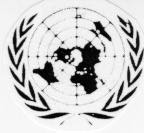
The General Assembly
Recalling the provisions of the Universal Declaration
of Human Rights, in particular articles 3,5,9, 10 and 11
concerning, inter alia, the right to life, liberty and security
of person, freedom from torture, freedom from arbitrary
arrest and detention and the right to a fair and public
trial, and the provisions of articles 6, 7, 9 and 10 of the
International Covenant on Civil and Political Rights, which
define and establish safeguards for certain of these rights,
Deeply concerned by reports from various parts of
the world relating to enforced or involuntary disappearances of
persons as a result of excesses on the part of law
enforcement or security authorities or similar
organizations, often while such persons are subject to detention
or imprisonment, as well as of unlawful actions or
widespread violence
Concerned also at reports of difficulties in obtaining
reliable information from competent authorities as to the
circumstances of such persons, including reports of the
persistent refusal of such authorities or organizations to
acknowledge that they hold such persons in their custody
or otherwise to account for them
Mindful of the danger to the life, liberty and physical
security of such persons arising from the persistent failure
of these authorities or organizations to acknowledge that
such persons are held in custody or otherwise to account
for them,
Deeply moved by the anguish and sorrow which
such circumstances cause to the relatives of disappeared
persons, especially to spouses, children and parents.
1. Calls upon Governments:
a) In the event of reports of enforced or involuntary
disappearances, to devote appropriate resources to
searching for such persons and to undertake speedy and
impartial investigations;
b) To ensure that law enforcement and security
authorities or organizations are fully accountable,especially in law, in
the discharge of their duties, such as accountability to include legal
responsibility for unjustifiable
excesses which might lead to enforced or involuntary
disappearances and to other violations of human rights;
c) To ensure that the human rights of all persons, including those
subjected to any form of detention and imprisonment, are fully respected;
d) To co-operate with other Governments,relevant
United Nations organs, specialized agencies, inter-governmental
organizations and humanitarian bodies in a
common effort to search for, locate or account for such persons in the
event of reports of enforced or involuntary disappearances;
2. Requests the Commission on Human Rights to
consider the question of disappeared persons with a view to making
appropriate recommendations;
3. Urges the Secretary-GeneraI to continue to use;
his good offices in cases of enforced or involuntary disappearances of persons, drawing as appropriate, upon the relevant experience of
the International Committee of the Red Cross and of other humanitarian
organizations;
4. Requests the Secretary-General to draw the concerns
expressed in the present resolution to the attention
of all Governments, regional and interregional o
rganizations and specialized agencies
s for the purpose of conveying on; an urgent basis th
e need for disinterested humanitarian action
to respond to the situation of persons who have disappeared.
90th plenary meeting
20th December;1978
Forced or involuntary disappearances
The XXIVth International Conference of the Red Cross,
Alarmed at the phenomenon of forced or involuntary;
disappearances,
perpetrated, connived at or consented to by
governments,
deeply moved by the great suffering such disappearances
cause not only to the missing persons themselves and their
families but also to society,
considering that such disappearances imply violations of
fundamental human rights such as the right to life, freedom personal
safety, the right not to be submitted to torture or cruel,
inhuman or degrading treatment, the right not to be arbitrarily
arrested or detained and the right to a just and public trial,
pointing out that families have a right to be informed of
the; whereabouts, health and welfare of their members, at right
which is laid down in various resolutions of the United Nations
General Assembly,
commending the efforts of the ICRC, the Working Group
established by the UN Commission on Human Rights to investigate the
phenomenon of forced or involuntary disappearances and various
impartial humanitarian organizations for the benefit of missing
persons and their families,
1) condemns any action resulting in forced or involuntary
disappearances, conducted or perpetrated by governments or
with their connivance or consent,
2. recommends that the ICRC take any appropriate action which might
reveal the fate of missing persons or bring their families relief and
urges that the ICRC Central Tracing Agency and any other impartial
humanitarian organization be granted the
facilities necessary to take effective action in this matter,
3) urges governments to endeavor to prevent forcedlfor
involuntary disappearances and to undertake and complete
thorough inquiries into every case of disappearance occurring
in their territory,
4) urges governments to co-operate with humanitarian
organizations, and with the relevant bodies of the United Nations
and of intergovernmental organizations, in particular those which
investigate forced or involuntary disappearances, with a view to
putting an end to that phenomenon.


VII MISSING PERSONS
88. The general question of missing persons or enforced
disappearances was on the agenda of the Parliamentary
Assembly of the Council of Europe in September 1984.
In the conclusions of his report (Doc. 5273) Mr. Verde
wrote:
Enforced disappearance is one of the most serious
violations of the human nights safe
guarded by international instruments: it infringes virtually
all the victims' personal rights and many of
the rights of their families. The violations are also
contrary to the 1949 Geneva conventions and cannot be justified
by special circumstances, whether armed conflict, state of
emergency or internal unrest or tension.
Under international law (eg Article 4 of
the International Covenant on Civil and Political Rights) there can
be no derogation from the obligation to respect a hard core of
rights, comprising the right to life, protection against torture and the
universal right to recognition as a person before the
law, which are infringed in the event of enforced disappearance. The
breach is so serious that it should
elicit the most severe international sanctions
89. The Assembly took much the same view as Mr Verde
and, after discussing his report, adopted Resolution 828
(1984) on enforced disappearances. There it branded these
disappearances as a flagrant violation of a whole series of human
rights, and called on the governments of United Nations
members states to support the preparation and adoption by the
United
Nations of a declaration declaring that enforced disappearances
is a crime against humanity and therefore not subject to
limitation.
Disappearances constitute a clear violation of international law. When a person has been taken into custody and the authorities nonetheless deny knowledge of this, internationally guaranteed human rights are contravened
such as: the right to security of the person; the right not
to be subjected to arbitrary arrest and detention and the
right to an effective remedy for acts violating fundamental
rights, as guaranteed by Articles 3, 9 and 8 of the Universal Declaration of Human Rights and Articles 9 and 2 of the Internallonal Covenant on Civil and Political Rights
(ICCPR)
A disappearance also contravenes Rule 92 of the UN
Standard Minimum Rules for the Treatment of Prisoners,
which states that an untried prisoner shall be allowed to
Inform Immediately his family of his detention and shall
be given all reasonable facilities for communicating with
his family and friends... The UN Commission on Human
Rights, in Resolution 1986/55, expressed its emotion
at the anguish and sorrow of the families concerned,
who should know the fate of their relatives. The suffering caused
by a disappearance to the relatives, as
well as to the victim, in itself contravenes the right not to
be tortured or subjected to cruel, inhuman and degrading
treatment or punishment.
Moreover, a person who has disappeared may have
been tortured or killed in custody in violation of the rights
guaranteed respectively by Articles 5 and 3 of the Universal Declaration of Human Rights and Articles 7 and 6 of
the ICCPR. The right to life and the right not to be
tortured are absolute rights enshrined in these articles
from which no state may derogate even in situations
of publicly declared emergency as defined in Article 4
of the ICCPR

APPLICATIONS No. 6780/74 AND 6950/75
CYPRUS
AGAINST
TURKEY
REPORT OF THE COMMISSION
(Adopted on 10 July 1976)
What follows is the conclusion of the European Commission on Human Rights, concerning the missing persons in Cyprus.
II. Missing persons
351. The Commission considers that there is a presumption of Turkish responsibility for the fate of persons; shown to have been in Turkish custody. However, on the basis
of the material before it, the Commission has been unable to ascertain
whether, and under what circumstances, Greek Cypriot prisoners declared
to be missing have been deprived of their life(6).

RETURN
 TO THE CYPRUS PROBLEM HOMEPAGE
TO THE CYPRUS PROBLEM HOMEPAGE
RETURN
 TO THE CYPRUS PANEL HOMEPAGE
TO THE CYPRUS PANEL HOMEPAGE











